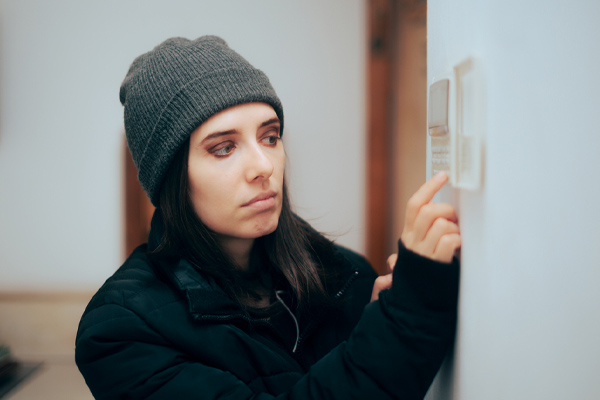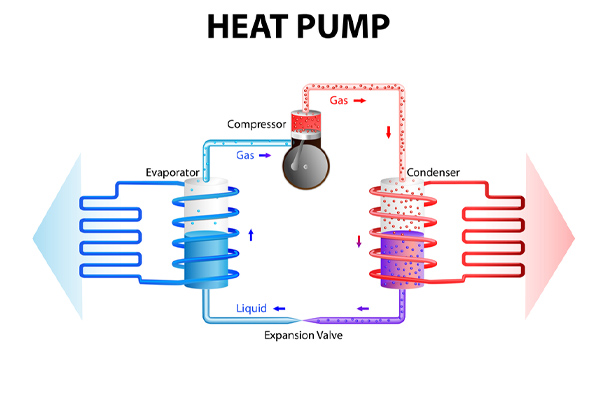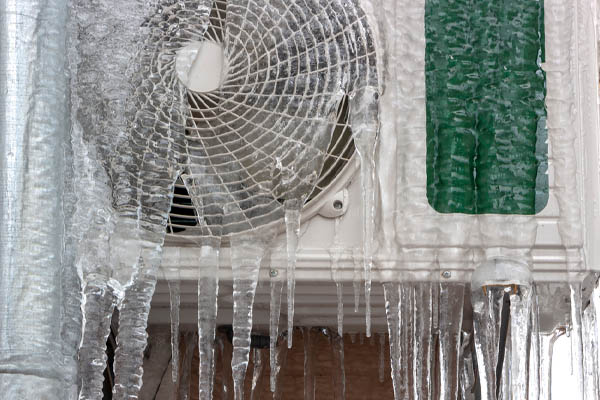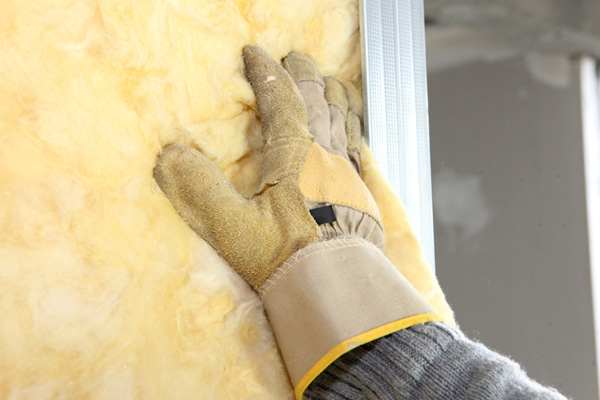Heat Pump Not Keeping Up: HVAC Troubleshooting Guide

You can count on your heat pump to keep you warm during the cold winter months. Simply adjust the thermostat to the proper settings and wait a few minutes and you will notice the difference. The unit will make every effort to make you feel as comfortable as possible. It does, however, have flaws and issues that need to be addressed from time to time, like any other HVAC system. Understanding these situations will enable homeowners to set realistic objectives and make the best choices when heat pump troubleshooting. We will look at a major issue in this article: a heat pump not keeping up when outdoor temperatures are cold.
Heat Pump Doesn’t Reach A Comfortable Temperature In The Winter
Contents
- 1 Heat Pump Doesn’t Reach A Comfortable Temperature In The Winter
- 2 Call McAllister Energy For Superior HVAC Solutions
It is a normal occurrence. The thermostat will be adjusted to a specified temperature by the homeowner, and the heat pump will attempt to attain it. The interior air temperature may remain a few degrees below the target no matter how long the system is working.
Because it is still warm enough, most people will not be bothered by the gap. Others are not happy with the failure to find the ideal match. They may schedule an appointment with their neighborhood HVAC professional. The technician may be able to identify a legitimate issue that requires repairs. The system, on the other hand, is more than likely to be operating normally. Heat pumps generally cannot produce huge amounts of heat in extremely cold temperatures.
How A Heat Pump Works

Let’s look at how heat pumps function to better understand this underlying constraint. These are multi-functional devices that can both heat and cool. In most cases, having a separate air conditioner in the summer and a furnace in the winter is unnecessary. Year-round, the heat pump can control the temperature of the house on its own, providing both heating and cooling. This makes installation and maintenance easier. It operates by transmitting heat from one side of the device to the other. A circulating refrigerant and well-timed pressure adjustment facilitate thermal transmission. Every heating cycle gets the house closer to the ideal temperature.
In the summer, heat pumps may cool households by enabling the refrigerant to absorb the heat from within. The heat is then emitted into the atmosphere through the exterior unit. A fan blows air across the coils to speed things up. The refrigerant is depressurized before proceeding to the next round. The procedure is reversed throughout the winter. Heat pumps transport heat from the outside to the inside of a structure. Given the bitter cold, this may seem strange, but it is possible as long as the temperature does not drop below zero.
Properly Working Heat Pump Fails To Reach A Specific Thermostat Temperature
It’s worth mentioning that as the weather cools, it becomes more difficult to gather heat outside. Once the temperature goes below 35 degrees Fahrenheit, heat pump efficiency begins to deteriorate. The system will struggle to keep the house warm when the temperature outside dips below zero degrees Fahrenheit.
It is one of the reasons heat pumps are most commonly utilized in areas that experience mild winters. Households with boilers or furnaces are more common in colder climates. A hybrid heating system, which combines a heat pump and a gas-fired heater, can also be used in homes. The former is suitable for use in mild weather, and the latter is suitable for use in extremely cold conditions.
Another option is to raise the thermostat a few degrees to get around this restriction. The current temperature setting, for example, may be 71 degrees, but the inside temperature cannot be higher than 69°F. Raise the temperature to 73-75 degrees to see whether the internal temperature improves. This is the most practical and simple technique to remain warm as it gets older. The heat pump is still operational, but it requires some assistance in order to deliver adequate heat.
Heat Pump Problems: Other Reasons Your Heat Pump Might Fail To Meet Thermostat Temperatures
Keep reading to explore some common heat pump problems, affecting how well your heat pump blows warm air in cold weather.
1. Frozen Outdoor Heat Pump System

Heat pumps that aren’t performing as well can be due to a frozen outdoor unit. If the temperature drops too low, ice may form on the gadget. This will obstruct airflow and prevent heat absorption. Heat pumps typically have the ability to go into a defrost cycle to help alleviate this issue. This should be sufficient to resolve this common heat pump problem and restore normalcy. If the ice refuses to melt, get professional assistance.
2. Malfunctioning Outdoor Heat Pump Unit
Even though the outside equipment is not iced over, it could be malfunctioning due to a faulty component. Perform some heat pump troubleshooting. Check that the power supply is on if the machine isn’t responding. Examine the openings for any material that may be clogging them. If you have clogged air filters, then be sure to replace your air filter. This will improve heating operation as well as improve indoor air quality. Contact an HVAC specialist if you still don’t observe any change after following these steps. There may be an issue with the reversing valve, the indoor unit, or other components that work to achieve a properly-functioning heating cycle.
3. Insufficient Home Insulation

Poor housing insulation may be the cause for your heat pump to fail at meeting the right temperature. The heat pump, despite its best efforts, is unable to keep up with the rate at which heat is lost through the walls and roof. There may be open windows that are allowing cold air inside. Perhaps there are air leaks that need to be caulked and weather-stripped. HVAC specialists can assist you in locating and repairing these concealed leaks to enhance energy efficiency.
4. Heat Pump Refrigerant Levels Are Low
If there is inadequate refrigerant in the system, the heat pump will struggle to absorb heat. Call a local HVAC technician to have the refrigerant leak repaired and the unit will require a refrigerant recharge. Check to see what kind of heat pump you have so that the technician can deliver the correct one.
5. The Heat Pump Is The Wrong Size
If the heat pump consistently underperforms, the issue could be its small size. Maybe it’s just too little for the house and can’t provide enough heat. If this is the case, HVAC experts can do a load calculation. Consider replacing a smaller heat pump with a larger one if necessary.
6. Faulty Thermostat
A thermostat issue might be causing the trouble in attaining the temperature settings. It is possible that the unit requires calibration. It might be due to faulty sensors or a low battery. You may also want to check to see if there is a heat source nearby that is causing distorted sensor readings.
7. An Aging Heat Pump
Finally, you might be dealing with an outdated heat pump that has seen a lot of wear and tear. Its efficiency has decreased, and so it struggles to produce adequate heat for the house. These heating units have an average lifespan of 12 years. If you have an older version, you might want to consider a complete replacement. You may need the assistance of an HVAC contractor when it comes to equipment selection.
Conclusion
On very cold winter days, heat pumps have a limited capability for delivering heat. This is simply due to the way these systems are designed. As a result, you don’t have to be worried that the equipment could have malfunctioned. Until the weather warms up again, the auxiliary heat pump settings or additional heating sources can keep the family warm. If you are not experiencing severe cold but are having poor performance, contact an HVAC technician for heat pump maintenance, repairs, or the replacement of your unit.
Call McAllister Energy For Superior HVAC Solutions

McAllister Energy offers high-quality HVAC services in Camden County, New Jersey. We hire only the best, professionally certified technicians who conduct superior heating and cooling services. Some of our HVAC services include HVAC maintenance, heating and cooling installations, repairs, ductless systems, energy audits, and much more. All our techs provide accurate HVAC services on time, every time.
Our company guarantees affordable heating and cooling service rates. Our maintenance services can increase your home’s comfort, energy efficiency, and cost-effectiveness. We can also provide you with a highly energy-efficient HVAC replacement system that fits your budget. Your satisfaction is important to us, so all our work comes with a guarantee. Book a service appointment with McAllister Energy today. We provide free, in-home estimates.
You can click here to contact us now or call us at (856) 665-4545 to find out more!